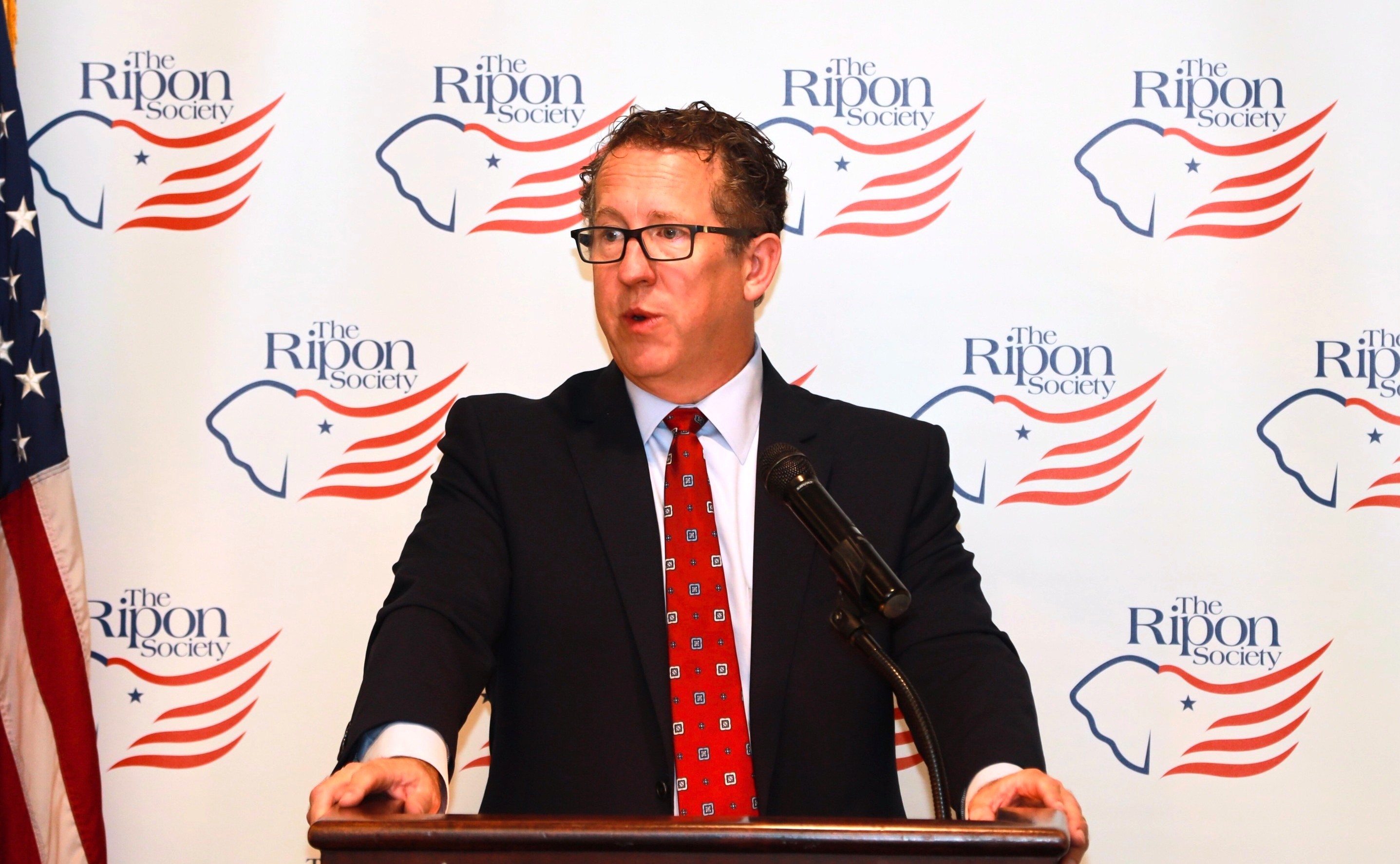
“It requires much diligence, and I think that the new administration is willing to perform the due diligence that is necessary to really push hard.”
WASHINGTON, DC – As trade talks and tariffs continue to dominate the airwaves across the country and the globe, U.S. House Ways & Means Subcommittee on Trade Chairman Adrian Smith (NE-03) appeared before a breakfast meeting of The Ripon Society to discuss the work he is leading to bring American trade back to the forefront of the global economy.
“When it comes to trade and our posture, there’s no such thing as just stagnation or marking time or treading water,” Smith stated matter-of-factly in his opening remarks. “We are either gaining or we are losing. And sadly, I think for four years under the previous administration, we lost a lot of ground.”
Smith, a sixth-generation Nebraskan, has served on the powerful Ways & Means Committee since 2010. As Trade Subcommittee Chair, he is charged with overseeing legislation related to customs, tariffs, imports and exports, trade agreements, and enforcement of international trade rules, as well as trade-related functions of key federal agencies.
“I think it is very conceivable that as we get our tax bill in place, as well as a lot of trade agreements with various countries, I think that can get us to a spot that will be good for everyone. That will be the rising tide that will lift a lot of ships and enable us to really do great things.”
“I think trade is far more bipartisan than it used to be, and this is a good thing. I think the most bipartisan component of trade policy is digital. But other countries expect more out of us than even maybe the beginning parts of IPEF. We should always expect other countries to be advocating in their own interests, just as they expect us to advocate in our own interest. It’s finding that commonality, those opportunities and synergies that can exist, where both sides of an agreement can benefit by reducing barriers.
“Obviously we’ve been hearing a lot about tariffs. I’m not a fan of tariffs. I get it – they’re a tool in the toolbox. The President has also been talking about non-tariff trade barriers. I think that’s important when it relates to agriculture and these other countries drum up reasons to keep our products out.”
Smith – who represents a district with more cattle than people – cited an ongoing trade issue with America’s longtime ally Australia. He shared that while the U.S. accepts Australian beef, Australia is currently rejecting 100% of U.S. beef, creating a situation he describes as “not right.”
“We need to engage in a way that can constantly keep up with newer technologies and more creativity from some of our trading partners as it relates to non-tariff trade barriers.”
“It requires much diligence, and I think that the new administration is willing to perform the due diligence that is necessary to really push hard. The previous administration I don’t think was, and it’s really sad because it was lost opportunity. We won’t get that back. Our trading competitors gained market share. That’s hard to get back. Moving forward, there’s a lot at stake and so many reasons to get these deals with various countries.”
The Chairman then discussed the flexibility that tariffs and trade deals provide to the Executive Branch, and how he does not want to see Congress restrict those important tools through rigid legislation.
“I’m not one that wants to codify a generic tariff in statute, even when that revenue might seem enticing. I think it takes away the agility of the president to make a deal. I don’t want our budget to become dependent on tariff revenue. We need to be very vigilant about that moving forward. So, as we think about what’s next after the reconciliation bill, I’m hoping that tariff relief programs, the preference programs, will be able to be addressed, especially with some expirations.”
One expiration coming up on the calendar is the African Growth and Opportunity Act which the Chairman noted he is not only hoping to extend, but modernize and modify “to take that next step.”
“A growing population stands to buy more of our products that we are good at exporting – food being one of those. Critical minerals, and available workforce – there’s a lot of reasons to engage more across the continent of Africa as we are seeing some strengthening of some domestic opportunities here.
“Nebraska is known as an agricultural state. We also have considerable manufacturing, and I’m proud that we have several small manufacturers, some larger ones too. We’ve got a lot happening there. It’s a reminder of how important federal policy is ultimately to the little guy, a manufacturer, but then ultimately, for consumers across our country.
“Kevin Brady was always and still is very good at articulating that, ‘Buy American is great, but we also need to remember that we want to sell American.’”
To view the remarks of Chairman Smith before The Ripon Society Thursday morning, please click the link below:
The Ripon Society is a public policy organization that was founded in 1962 and takes its name from the town where the Republican Party was born in 1854 – Ripon, Wisconsin. One of the main goals of The Ripon Society is to promote the ideas and principles that have made America great and contributed to the GOP’s success. These ideas include keeping our nation secure, keeping taxes low and having a federal government that is smaller, smarter and more accountable to the people.



